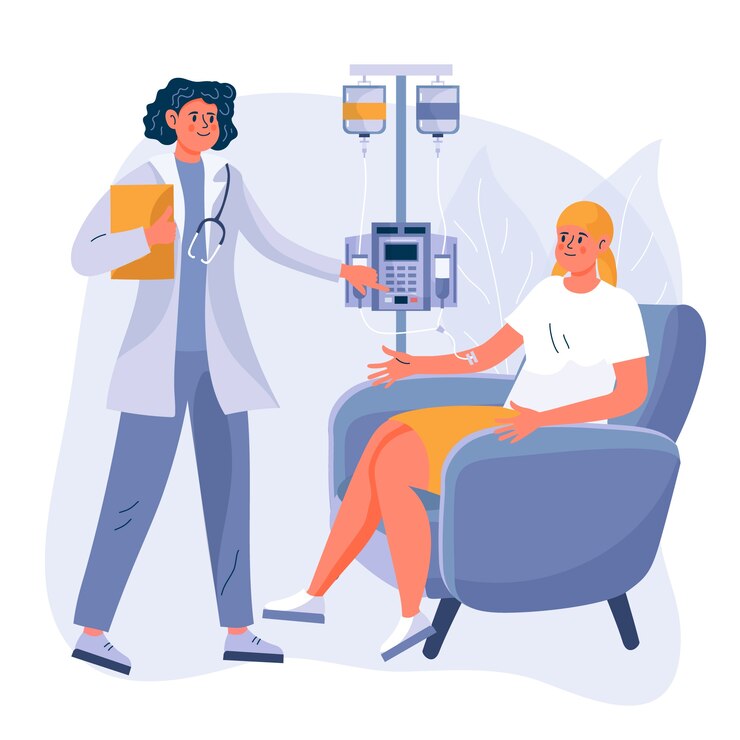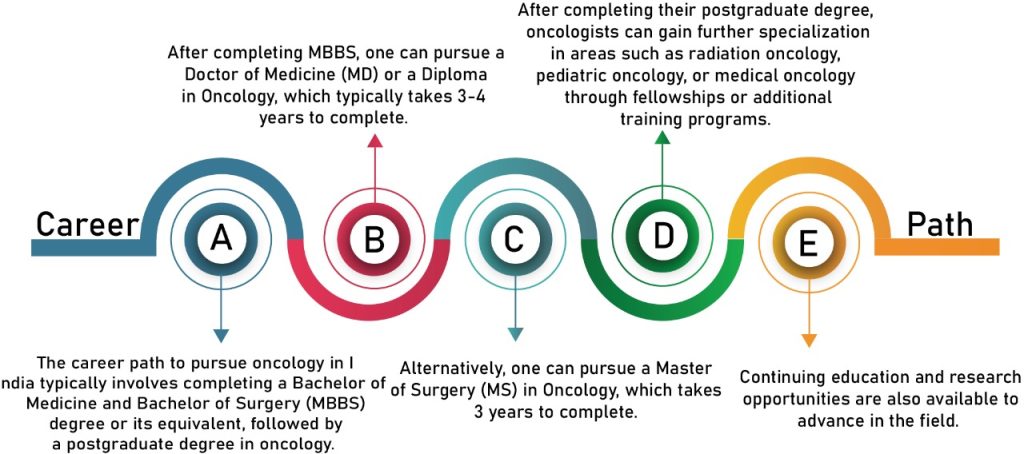Oncology is the branch of medicine that focuses on the prevention, diagnosis, and treatment of cancer. It involves the study of cancerous tumors, their growth, and how they can be treated or removed. Oncologists are medical specialists who work closely with other healthcare professionals, such as surgeons and radiation therapists, to develop and implement a personalized treatment plan for each patient. They use various tools and techniques, such as chemotherapy, radiation therapy, and surgery, to treat cancer and improve the quality of life for cancer patients. Oncology is a constantly evolving field, with ongoing research and development of new therapies and treatments

Work description
Oncologists are medical doctors who specialize in the prevention, diagnosis, and treatment of cancer. Their work involves evaluating patients who have been diagnosed with cancer, developing a personalized treatment plan, and overseeing the delivery of that treatment.
Oncologists work closely with other healthcare professionals, such as radiologists, pathologists, and surgeons, to provide comprehensive care to cancer patients.
They may use a variety of treatment options, including chemotherapy, radiation therapy, and immunotherapy, to treat cancer and manage its symptoms.
Oncologists also play an important role in providing emotional support to their patients and their families, as cancer can have a significant impact on quality of life.
High Demand
Opportunity to make a significant impact on patients’ lives
Lucrative salaries
High demand for oncologists, leading to job security and high earning potential
Opportunities for innovation
Continuous learning and research opportunities to advance the field
Versatility
Collaboration with a multidisciplinary team of healthcare professionals
Flexibility
Option to specialize in specific areas within oncology, such as radiation oncology or pediatric oncology
Job satisfaction
The potential to specialize in areas such as sustainable design, structural engineering, or building systems design.
High stress
Emotionally challenging work due to dealing with patients who may be terminally ill
Long hours
Long working hours and high workload, particularly in hospitals
Competitive field
Potential for burnout and compassion fatigue
Constant learning
High stress and pressure to make life or death decisions
Isolation
Limited opportunities for work-life balance due to the nature of the job.
Eye strain and other physical health issues
The potential for competition for jobs, particularly in areas with high demand for architectural engineering services.
- The cost of pursuing a career in oncology in India can vary widely depending on several factors such as the type of degree or specialization, the institution, and the location.Generally, a medical degree from a reputable institution can cost anywhere from INR 10-25 lakhs in India. Specializing in oncology can require additional training, which may range from a few months to several years, and can cost anywhere from INR 1-10 lakhs depending on the program.
Additionally, pursuing advanced degrees such as a Doctor of Medicine (MD) or a Doctor of Philosophy (PhD) can require significant financial investment. However, many institutions in India offer scholarships, grants, and other forms of financial assistance to students pursuing careers in oncology.
[wpcharts type=”horizontalbarchart” bgcolor=”red:gray:yellow,blue:gray:yellow,random:gray:yellow,purple:gray:yellow” min=”0″ legend=”true” titles=”2 year , 5 year” values=”3,7,5,12″]
The earning potential of an oncologist in India can vary depending on several factors such as the level of experience, specialization, and location.
Generally, an oncologist with 1-3 years of experience can earn an average salary of INR 7-12 lakhs per annum. With 5-10 years of experience, an oncologist can earn an average salary of INR 15-25 lakhs per annum. Those with over 10 years of experience can earn upwards of INR 40 lakhs per annum.
However, it’s important to note that these are average figures and may vary based on factors such as the institution, location, and level of expertise. Additionally, those with advanced degrees or specializations such as radiation oncology or pediatric oncology may command higher salaries.
[wpcharts type=”horizontalbarchart” bgcolor=”red:gray:yellow,blue:gray:yellow,random:gray:yellow,purple:gray:yellow” min=”0″ legend=”false” titles=”Entry-Level, Mid-Career, Senior-Level ” values=”5,15,25,35,45,55″]
Compassion and empathy for patients.
Compassion and empathy for patients.
Compassion and empathy for patients.
Ability to work in a fast-paced, high-stress environment.
Willingness to continually learn and adapt to new research and treatment methods.
Good visualization skills to create and interpret 2D and 3D drawings, models, and renderings.
Ability to work well in a team environment, collaborate with others, and provide leadership when necessary.
Inability to handle emotional stress and difficult situations
Poor communication skills and lack of empathy for patients
Inattention to detail, which can be crucial in diagnosis and treatment planning
Lack of interest in research and continuous learning
Inability to work in a team or collaborate with other healthcare professionals.
An inability to handle stress and pressure, which can be high in roles that involve managing complex projects or tight deadlines.
A lack of attention to detail, which can lead to errors and safety issues in designs.
Work-life balance
As an oncologist, work-life balance can be a challenge. The demands of treating patients with cancer are high, and the emotional toll of dealing with serious illnesses can be significant.
Oncologists often work long hours, including evenings and weekends, to provide the best possible care to their patients. However, many oncologists find ways to balance their work with their personal lives by prioritizing self-care, setting boundaries, and finding support from colleagues and loved ones. This can include activities such as exercise, meditation, spending time with family and friends, and taking time off to recharge.
Overall, while the demands of the job can be intense, many oncologists find meaning in their work and are committed to finding ways to maintain a healthy work-life balance.

Oncology can be a very rewarding career, as it involves helping people with cancer and making a positive impact on their lives.
Oncologists have the opportunity to work with cutting-edge medical technology and research, contributing to the development of new treatments and therapies.
The job can be physically demanding, as oncologists often work long hours and must be able to handle the physical demands of administering treatments and performing surgeries.
There is a high level of responsibility associated with being an oncologist, as the decisions made by doctors can have a significant impact on patients’ health and well-being.
The demand for oncologists is expected to grow in the coming years, due to an aging population and increased rates of cancer diagnoses.
Oncology can be a competitive field, and obtaining the necessary education and training can be challenging and time-consuming.
Medical oncology
the treatment of cancer using chemotherapy, immunotherapy, and targeted therapy drugs.
Radiation oncology
the treatment of cancer using high-energy radiation to kill cancer cells.
Surgical oncology
the treatment of cancer through surgery to remove tumors and surrounding tissue.
Pediatric oncology
the treatment of cancer in children and adolescents.
Gynecologic oncology
the treatment of cancers specific to the female reproductive system.
Conclusion:
In conclusion, oncology can be a challenging but rewarding career choice for those who are passionate about helping people with cancer. There are several specializations within oncology, each with its own unique set of challenges and opportunities. While the emotional and physical demands of the job can be significant, many oncologists find meaning in their work and are committed to improving the lives of their patients. As the demand for oncologists continues to grow, those interested in pursuing a career in oncology should be prepared for a competitive and demanding field that requires extensive education, training, and ongoing professional development.



